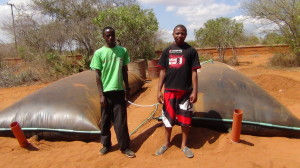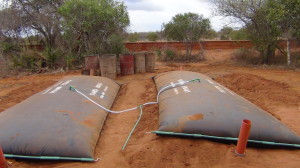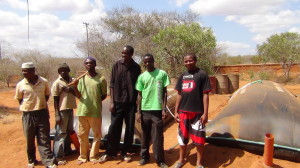Wildlife Works Embraces New Biogas Project
- Wildlife Works
- 13 ago 2012
- 3 Min. de lectura
Here at Wildlife Works Kasigau Corridor REDD+ Project, we are constantly looking for opportunities to coordinate with the next generation of young Kenyans who devote their time and intellect to developing environmentally sustainable innovations.
Meet 21 year-olds Daniel Njuguna, a recent secondary school graduate, and Edward Mwakisima, a Sociology student at Catholic University. They are currently developing a system to promote alternative energy use for everyday activities, in an effort to reduce the harmful effects of charcoal production in the area.

The project began when Edward informed Daniel of the water shortage problem that was being experienced in his hometown of Maungu, a small village located within Wildlife Works’ Kasigau Corridor project area. The shortage is a result of deforestation in the area by people producing illegal bush charcoal for domestic use. Daniel grew determined to develop an environmentally friendly solution that would discourage the use of bush charcoal. Together, the two came up with the idea to harness cow dung to produce a burnable form of biogas, as an alternative to traditional charcoal.
Biogas typically refers to a gas produced through fermentation of biodegradable material such as biomass, manure, sewage, green waste, plant material and crops. Organic waste such as dead plant material, as well as animal and food remains can also be used.
This particular form of biogas holds a unique potential to combat climate change. Instead of letting the cow dung decompose naturally and release methane gas into the atmosphere, this system harnesses its capabilities as an eco-friendly fuel source. And, of course, widespread use of this and other forms of biogas would likely diminish the amount of deforestation for the purpose of producing charcoal.
We were happy to be pioneers in the area by testing out Daniel and Edward’s biogas system in our operations in Rukinga. Using a simple process, we are hoping to eventually do all of our cooking using this form of biogas.
The production process is as follows:
To start, the manure and water are mixed in a tank; once sufficiently stirred, the mixture is fed into a commercial black bag, which is portable. The bag can hold 6m3 of gas and is kept in the sun in order to increase the fermentation process. A temperature of 36 ° C is advisable for the system, which is perfect for Maungu since it has a sub-tropical climate. Methane gas given off by the fermenting mixture is funneled through tubing to a gas burner, and ready for use in cooking! The manure mixture is then renewed every two weeks.

We are excited about the many potential consumer benefits of Daniel and Edward’s system. First, the clean cooking energy would reduce indoor air pollution, and reduce the amount of time needed for traditional biomass collection, especially for women and children. Additionally, the post-biogas slurry is a clean organic fertilizer that can potentially be used to increase agricultural productivity. The biogas can also be converted and burnt in a generator, leading to less fuel consumption.
In Rukinga, the biogas project is still a work-in-progress. We are continuing to work with Daniel and Edward to iron out certain issues with the system, which is still in its very early stages. Since our canteen is used to cook food for such a large volume of people (about 250), it will be necessary to develop a compressor in order to get a big enough flame. As of now, however, we have successfully been able to use the biogas to keep our food warm.

We are hopeful about the future of this project, and will keep our readers updated as we continue to work with Daniel and Edward to develop and perfect the system!



